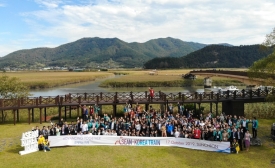youth

Seksan Anantasirikiat reflects on the 10th anniversary of the ASEAN-Korea Centre (AKC) and its people-centered approach to strengthening relations between ASEAN and South Korea.
Focusing on the impact of social media on the youth, Pashollari said: “In the UAE, the youth represents 60 per cent of the population. Governments must therefore consult the youth before implementing policies, and social media represents the perfect medium to enable this two-way communication. In addition, it can encourage the youth to create public opinion on important international issues..."
Germany's Marshall Plan with Africa received a lot of praise but also criticism [...] The so-called "Marshall Plan” - drawing a direct parallel to the huge United States program that kick-started the ravaged German economy after World War Two - talks about a new level of development cooperation. The plan foresees a complete restructuring of the German economic cooperation with Africa.
Something of a musical exchange-student program, the organization brings young musicians from all over the world to the U.S. together for a month each year to collaborate on music. Started in 2012, OneBeat hopes to celebrate the ways that the arts can impact local and global communities, as well as help people connect across cultures through music.
As number 16 in the world medal chart in Rio and currently top in Africa, Kenya is in the league of the world’s sports powers. Kenya should fund its nationalist project as part of its sports diplomacy and projection of soft power. There is no reason why gold medallists should not be full ambassadors and remunerated accordingly. The country must consciously and innovatively invest in its sports talents.
Participants build an electrical circuit based on a button battery during the recent WiSci camp in Peru [...] The camp is designed to expose the girls to a range of careers in science, technology, engineering, arts and mathematics (STEAM) fields, while the simulation exposed them to another very important option that could use more women with science and technical backgrounds: public service and diplomacy.
Young girls and their families from across the Twin Cities gathered Tuesday night to hear from the world’s youngest Nobel Peace Prize winner. Malala Yousafzai, a 19-year-old Pakistani activist who has been targeted by the Taliban, shared her views on the world with those gathered at the Target Center in Minneapolis.







